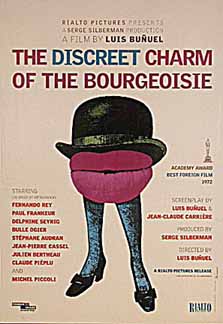The Discreet Charm of the Bourgeoisie has it all: surrealism, French humor, social commentary, non sequiturs, 1970s film sex, and a bizarre logic of the modern bourgeoisie. Filmed in 1972, The Discreet Charm of the Bourgeoisie was directed by Luis Bunuel, the same man who worked with Salvador Dali on Un Chien Andalou. It’s no surprise, then, that this film would be equally as weird—though this time in Technicolor and with sound.
Like most works of surrealism, the film follows the stream of dream logic, with no one actually dying and everything a part of something larger that can’t be seen. And while it contains one of the most indescribable plots I’ve ever seen, I’ll try to do my best to cover some of the film’s highlights.
First off, there’s six main characters; three men, three women. All of them are connected by cocaine trafficking and their bourgeois class status. If that seems like an odd juxtaposition, then it only follows that everything else would be veiled in random juxtapositions as well. The film follows these characters around, with other characters randomly interposing within the film with little or no reason—though the most common reason is so that these characters can tell the main characters their dreams.
That is perhaps the predominant theme of the film: dreams. They’re everywhere. And just when you think the film has turned for the worst and they’re all going to die, another character wakes up and realizes he was dreaming it all. So, what is real? A better question asked than actually answered.
That’s the thing, you just don’t know what’s real, what’s not. It’s all a random compilation of images that follows the loose guidelines of a plot. But it’s intriguing. The surrealism within the film keeps you guessing from one scene to the next, wondering what will happen. I’m surprised more recent films haven’t used the thematic device of surrealism, because it can certainly pique your interest.
But invariably, I believe The Discreet Charm of the Bourgeoisie is trying to answer several questions: One, could a surrealist make a major motion picture and win an Academy Award for it?—The answer is yes. Two, what is the discreet charm of the bourgeoisie?—That is perhaps a little more nuanced. You’re inevitably led to the conclusion that these people are hypocrites, living in a world they’ve constructed themselves in order to impose their will onto others, and it’s not necessarily a very healthy world. They run a cocaine ring and they’re unable to be arrested or brought to justice because one of the male characters is an ambassador of a Latin American country rife with corruption and deceit. That, perhaps, would be a better title for the film: The Deceiving Charm of the Bourgeoisie. I don’t think it’s a coincidence of Bunuel’s to have chosen a word to close to the other—though that’s probably not true, since the original title was in French.
Whether you like relatively old films, surrealist film, or was just wondering what surrealism looked like at its best, then The Discreet Charm of the Bourgeoisie will sure to entertain you. It’s filled with ulterior meanings, and questions the very fabric of reality, and only in the distinct style that Bunuel can offer.
The Discreet Charm of the Bourgeoisie,




